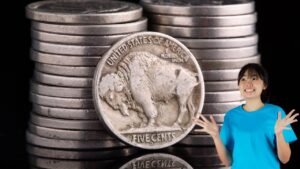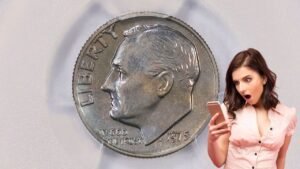Imagine pulling out some spare change and realizing one coin could make you a millionaire. That’s exactly the story behind the 1943 copper Lincoln Wheat Penny, now valued at an incredible $5,500,000. Even more fascinating? Experts believe some of these rare pennies may still be in circulation today.
A Brief History of the Lincoln Wheat Penny
The Lincoln Wheat Penny first appeared in 1909, marking Abraham Lincoln’s 100th birthday. Designed by Victor D. Brenner, it was also the first U.S. coin to feature a real person.
- Front (Obverse): Lincoln’s profile
- Back (Reverse): Two wheat stalks framing the words “One Cent” and “United States of America”
This wheat design lasted until 1958, when the Lincoln Memorial replaced it. Today, Wheat Pennies are collector favorites—especially rare editions like the 1943 copper version.
Why the 1943 Penny Is So Rare
Most Wheat Pennies aren’t worth much. But certain versions are extremely valuable, thanks to limited mintage and minting errors.
The 1943 copper penny is the most famous example. During World War II, the U.S. Mint switched from copper to steel to save the metal for the war. However, a few leftover copper blanks from 1942 mistakenly got used, producing around 40 copper pennies in 1943.
That tiny mistake created one of the rarest and most valuable coins in American history—today worth as much as $5.5 million.
Could One Still Be in Circulation?
Yes! Many people don’t recognize the difference between a regular 1943 steel penny and the rare copper version. These coins can easily sit unnoticed in piggy banks, jars of spare change, or old coin collections.
Since pennies are still widely used, experts believe a few could still be floating around.
How to Identify a 1943 Copper Lincoln Wheat Penny
Here are some quick checks to help you spot a potential fortune:
| Feature | What to Look For | Why It Matters |
|---|---|---|
| Date | 1943 | Only this year’s copper version is rare |
| Color | Reddish-brown copper, not gray steel | Genuine rare version |
| Magnet Test | Copper won’t stick; steel will | Simple home test |
| Reverse Design | Wheat ears on both sides of “One Cent” | Authentic Wheat Penny design |
| Condition | Don’t clean it | Cleaning reduces collector value |
If you suspect you’ve found one, take it to a coin dealer or grading service instead of cleaning or polishing it.
The Legacy of the Million-Dollar Penny
The Lincoln Wheat Penny valued at $5.5 million is a reminder that history and fortune can hide in the smallest places. From an old drawer to a pocket full of change, anyone could stumble upon this incredible piece of American history.
So next time you spot a penny, don’t dismiss it—it could be the key to a life-changing discovery.
FAQs About the 1943 Copper Lincoln Wheat Penny
Q1. What makes the 1943 penny so rare?
It was mistakenly struck in copper instead of steel during World War II.
Q2. How do I test if my 1943 penny is copper?
Use a magnet—copper pennies won’t stick, but steel ones will.
Q3. Are 1943 copper pennies still in circulation?
Yes, a few may still be hidden in collections or change jars.
Q4. Should I clean my old penny before selling?
No. Cleaning can lower its value significantly.
Q5. Where can I confirm if my penny is valuable?
Visit a trusted coin dealer or submit it to a professional grading service.



